Is My Baby Eating Too Much Solid Food Too Early?
- What typical consumption patterns look like
- Why your baby’s intake levels decline close to the 1 year mark
- How to know if your baby wants more…and which foods to offer

LISTEN TO THIS EPISODE
Episode Description
Is my baby overeating or eating too much too early after starting solid foods? In this interview I’m answering 3 moms’ questions about their concerns of babies overeating and addressing what typical consumption might look like at the various ages and stages of baby-led weaning…and why it’s ok if meals or days deviate from that routine.
Other Episode Related to this Topic
- Episode 185 - 6-7 Months Old Babies: Sample BLW Feeding Schedule
- Episode 17 - Feeding Schedules: How Often Should I Feed My Baby?
Links from Episode
- Baby-Led Weaning with Katie Ferraro program with the 100 First Foods™ Daily Meal Plan, join here: https://babyledweaning.co/program
- Baby-Led Weaning for Beginners free online workshop with 100 First Foods™ list to all attendees, register here: https://babyledweaning.co/baby-led-weaning-for-beginners

Latest Episodes
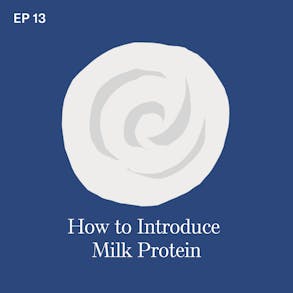
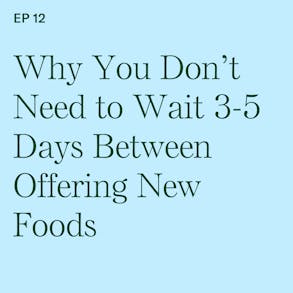
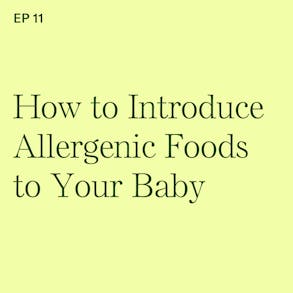
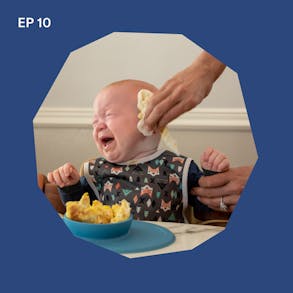
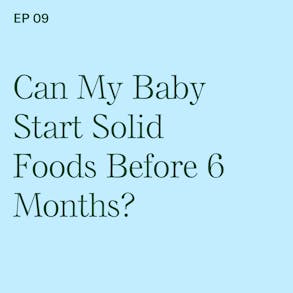
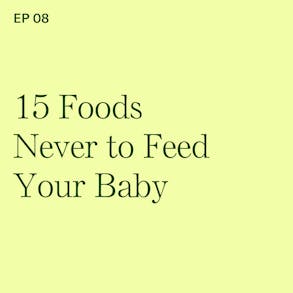
Katie Ferraro (31s):
So which foods are not safe for your baby to eat? You guys know I'm usually all about sharing all of the foods that your baby can safely eat, but there are definitely some foods that we steer clear of when starting solid foods. I have a free Feeding guide called 15 Foods Never to Feed That will help you recognize which foods aren't safe. Now most of the foods inside the 15 foods Never to Feed Guide we avoid because they're choking hazards. But I'm providing you with tips on how to modify those foods So. they are safe for your baby to eat. You can download the 15 foods never to feed free Feeding guide by going to baby led weaning dot co slash resources.
Katie Ferraro (1m 11s):
Again, that's baby led weaning. Do co slash resources to download your free Feeding guide 15 Foods Never to Feed with the modification tips on how to make those foods safer, happy feeding. And when your baby gets the hang of eating solid foods, it's gonna be out eight to 12 weeks After you start, you'll kind of be blown away because there will be some days where you're like, oh my gosh, now that nine or 10 month old baby they just ate more at breakfast than me as an adult ate. And then the next meal, they might not eat anything or tomorrow the same breakfast. They might not touch it as long as we are observing for and reacting to and recognizing and allowing our baby to respond to those hunger and fullness cues. Don't stress about it. Your baby is not going to overeat on purpose.
Katie Ferraro (1m 55s):
Hey there, I'm Katie Ferraro, Registered dietitian, college nutrition professor and mom of seven specializing in baby led weaning Here on the Baby Led Weaning Made Easy podcast. I help you strip out all of the noise and nonsense about feeding, leaving you with the confidence and knowledge you need to give your baby a safe start to solid foods using baby led weaning. I know a lot of parents stress out when their baby starts solid food. Oh my gosh, my baby's not eating enough, they're not getting enough Katie, what do I do? And then the baby is a baby So. they need lots of time to learn how to eat and then they start getting the hang of eating and then the pendulum totally swings the other way and you're like, oh my gosh, is my baby eating too much food?
Katie Ferraro (2m 40s):
Is it too early for my baby to be eating this much? That's what I want to cover in this podcast episode. Is my baby eating too much solid food too early? Now why are we covering this topic? Because just recently on my office hours, so each week inside of my program I have a segment where we do live office hours and I, I answer baby led weaning questions from parents who come on. And there was three distinct questions from different moms about their babies eating too much. Now the first one, I'm gonna read you the questions throughout the course of this episode and we're gonna kind of go through and troubleshoot and I'll tell you how I answered their questions. But If, you don't have time to listen to the whole episode. Your baby's not eating too much food. If, you are following your baby's hunger and their fullness cues.
Katie Ferraro (3m 22s):
They're gonna BLW you away with how much food they eat. Some days like there's days where like 10 and 11 month old babies will legit eat more food at breakfast than you do. And then like the next meal they'll eat nothing and the next day they might not eat as much as they did the day before. It's very inconsistent and that's all very typical. So here's the first question. This is from a mom On my office hours of an 11 month old baby, I feel like I might be overfeeding my baby. It just sometimes feels like she's eating as much as we do. Here's what my baby might eat in a day for breakfast. Two muffins or two pancakes, a banana and an egg for lunch. Four ounces of a chicken enchilada, three ounces of mixed veggies, one or two pea fritters for dinner, three ounces of mashed potatoes, four ounces of broccoli, quinoa casserole, and 10 or more raspberries. And then mom says sometimes she'll even ask for more.
Katie Ferraro (4m 3s):
And I know it doesn't all make it in her mouth, but a lot, most of it actually does. My baby's also drinking about 16 ounces of formula per day. What was my response? This sounds fabulous. Congratulations. By close to 12 months of age, you've got that milk nice and tight at around 16 ounces. So you're gonna move right into cow's milk when the baby turns one, keeping that somewhere between 16 to 24 ounces of cow's milk so you're not overdoing it on the milk, which is great And, you baby's eating three times a day if that mimics the way the rest of the family eats. Great. I love that you have a variety of foods. You're doing some starchy foods, there's some fruits, there's some vegetables in there, there's some protein foods in there. I know that this family's also done all of the allergenic foods.
Katie Ferraro (4m 44s):
So even though some days it might look close to like how much you would eat at least at one of those meals, usually breakfast is when parents are like, oh my gosh, the baby eats so much. There's absolutely nothing problematic about this. Again, just keep on observing for those hunger and those fullness cues. Some days she's not gonna eat that much and I do like to remind parents that as we approach the one year mark, your baby's rate of growth will slow down. So they'll actually start eating less around 12 months of age than they did at nine, 10, sometimes 11 months of age. And that freaks parents out 'cause they're like, hold up, the baby's getting older, they're getting bigger, right? The clothes size are getting bigger, then the diaper sizes are getting bigger. Shouldn't the meal sizes be getting bigger? But no, not necessarily. Again, that rate of growth is going to slow down.
Katie Ferraro (5m 25s):
Your baby's still growing rapidly, but they kind of peak at around 10 or 11 months of age with regard to the volume of food that they'll eat. That compared to like the first part of toddlerhood, you know when they cross over that one year mark, just be careful. Remember the two biggest saboteurs of the toddler diet are milk and snacks. If, you don't have any snacks in there and you're keeping the milk nice and tight. Your child will be experiencing what I call some casual hunger when they come to mealtimes and they'll actually eat the foods that you prepare. So mom of the 11 month old baby, definitely nothing to be concerned about. Here's another question. This is from a mom who has a 10 month old Hi Katie. My son loves eggs. He probably eats them half the week for breakfast, usually with veggies mixed in. I know there are a ton of benefit from eggs, but I worry that we're giving him too many eggs.
Katie Ferraro (6m 7s):
I've heard they're high in cholesterol. Can I give my baby too much? Now in this situation, I mean there definitely is or are situations where You can be feeding your baby too much of one food. This would not be problematic, I don't think you know eggs a couple of times a week if that's a good default protein for you at breakfast time. Proteins sometimes kind of hard at breakfast, right? Like And, you don't have to have a protein food at every meal. All the foods that you're offering will have a couple of grams of protein here and there. And, if you're offering a variety of foods, like babies are not walking around with like widespread protein deficiency in the developed world. However, we don't wanna get in the habit of offering the same food every day. Now I wanna address what the mom was really concerned about here from a nutrition standpoint. She's talking about cholesterol, okay?
Katie Ferraro (6m 49s):
The amount of cholesterol, first of all, we're not concerned about heart disease development when your baby is like less than 12 months of age, right? You got, you got priorities here, things we want your baby to learn how to do. One of them is learn how to feed themselves. Don't stress out about their risk for heart disease the rest of your life to do that. And I'm being a little facetious, but the cholesterol thing can be confusing. So, and sometimes parents do hear the messaging, oh my gosh, I've been told if my family's at high risk for heart disease to pay attention to thing like saturated fat and cholesterol for my baby, absolutely not a priority. Okay? Later on in life, if your child is exhibiting signs and symptoms of heart disease, strong family history, then You can worry about that. But right now fat is actually a very good thing for your baby. And we want your baby to get adequate fat from their diet. And fat helps your baby's still developing brain.
Katie Ferraro (7m 31s):
Not to mention that If, you know anything about blood cholesterol levels, the dietary cholesterol that a person is eating has almost no bearing on their blood cholesterol levels. 'cause parents will think like, oh, well my family is high cholesterol, so I shouldn't eat cholesterol containing foods like eggs. Not true. It's actually the saturated fat in animal foods that is much more likely to elevate the bad or the LDL cholesterol levels. So I'm not worried about the cholesterol and the eggs. Now if you're frying those eggs in a bunch of butter that's laden with saturated fat and topping them with a ton of cheese that has a lot of saturated fat, that's a problem because it's a saturated fat in the diet that raises blood cholesterol levels. But again, it doesn't really matter. It's kind of moot for Babies great that you're offering your baby high fat foods.
Katie Ferraro (8m 11s):
Do a variety of foods. Don't get stuck on any one food every day. If, you do offer the same food every day. All you're doing is conditioning your baby to be expecting that food every day. So mix it up. But don't stress If. you have to rely on some foods like eggs on occasion, even a couple times a week. It's actually beneficial in the sense that eggs being a potentially allergenic food. You're reintroducing that egg protein over and over. And we know research shows us that early introduction of those potentially allergenic foods and doing them early and often things like eggs actually helps to lower your baby's risk of egg allergy down the road. So good for you mom, and continue with a variety of foods and don't stress about cholesterol. Hey, we're gonna take a quick break, but I'll be right back.
Katie Ferraro (8m 54s):
My phone is bursting at the seams with photos of our kids and over the years I've tried all sorts of different ways to store and share them with family members. So for a while I would just text out pictures to the grandparents and then we tried a shared photo album. But some people were using Google photos and others preferred Facebook Messenger for pictures and the more kids we had, the messier it got. Then I stumbled across the family album app. The Family album app was created to give parents a secure and easy way to share photos and videos with loved ones. It's a totally secure personal haven for your family's memories. I love that there's no third party ads, no unwanted eyes, and it's totally free. No more scrolling through endless feeds or searching folders to find the picture of the kid that you need right now.
Katie Ferraro (9m 36s):
Another cool feature about the Family Album app is You can order eight free photo prints every month to be delivered to your home, which If you think about how quickly your baby is changing. It's really nice to have some tangible pictures to hold onto or share to document the last month of your baby's life. If, you are looking to level up your photo sharing and organization game with a secure one-stop, easy to use photo organization app. Head over to the app store, search family album, download the family album app and start creating a legacy of love. One photo at a time. Final question about feeding your baby too much too early comes from a mom named Stephanie. She has a seven month old baby.
Katie Ferraro (10m 17s):
She said, hi, Katie. Is there such a thing as overfeeding after feeding, I feel like my baby complains or seems to show signs of wanting more. What's a good option to add or to offer? So my suggestion here is first off, props to Stephanie for looking for observing, for, and trying to respond to her babies hunger and fullness cues. A seven month old baby though is pretty unlikely to be able to meet their hunger needs from foods alone. Your baby just started solid foods mm, like a couple weeks ago. So they're still getting most of their nutrition from infant milk. That's breast milk or formula as you're giving them lots of time to learn how to eat solid foods. So by six or seven months of age, I hope you're offering solid foods one to two times a day, but know that they're not actually going to eat very much.
Katie Ferraro (10m 58s):
Now maybe your baby's enjoying food. There's some babies who just hit the ground running like they're sitting up, they're reaching for the food, like they're into this eating thing and they might eat or smash or drop all of the food that you put in front of 'em and you're like, oh, what do I do? Do I give them more? It's your call. We're trying to get your baby to be comfortable sitting in the highchair for meals for around 20 minutes. Sometimes they're gonna dispose of the food prior to that. Again, a lot of times it's dropping it 'cause they don't know what to do with it or they're smashing it. Or, they get a tiny bit of it in their mouth. There's not a ton of eating going on. But if they're enjoying the eating process, And, you are up for sitting there for a little bit longer. And, you have extra food to put out there and offer. Yes, definitely go for it. Some parents worry, well, I'm just gonna be wasting the food 'cause they're not eating it.
Katie Ferraro (11m 38s):
No, not necessarily. Learning how to eat is a full sensory experience, right? Your baby needs to smush the food and smash it and taste it eventually, but they're gonna put it in their ear and put it in their hair and they're gonna drop some of it on the floor. I would suggest putting a clean splash mat underneath your Cher so the baby drops the food down on the splash mat. You can recycle it from the splash mat back up onto the plate or the bowl that's on the tray or the table. I do that a number of times. I usually do it about three times before. I'm like, all right baby, we're done here. And then after that I'll kind of let it go. But when it comes to the splash mats, the ones I love are from this company called Bapron Baby, So. they make these huge, lightweight, waterproof splash mats. They are the most durable. I've had some of mine for like seven years now.
Katie Ferraro (12m 20s):
I wash them almost every day. Good as the day that they were new If. you want to check out the vapor and splash mats. The website is Bapron Baby, B-A-P-R-O-N baby, and my code KATIE10 works for 10% off. They also carry Bapron splash mats on the Easy Peasy website and the affiliate discount code. KATIE10 works for 10% off there. But as far as like what should you finish the meal off with, so my baby is quote unquote getting enough, don't get in the habit of doing that. Okay? We want you to offer one new food to your baby every day. I teach a five step feeding framework where we offer five new foods a week, do a new fruit on Monday, a new vegetable on Tuesday, a new starchy food on Wednesday, a protein food on Thursday, and an allergenic food on Friday after those five foods. We then do the allergenic food multiple times over the weekend with no other new foods in there in order to observe for reactions and then go right back to five new foods the following Monday.
Katie Ferraro (13m 7s):
If, you keep moving forward with one new food a week, and at the same time you're continuing to reintroduce the familiar foods from previous days. Your baby is getting lots of exposures to new foods and even If. they don't eat that much of the food. You don't have to worry. You can trust that they're going to eventually learn how to eat those foods. They're gonna be filling in their nutrition gaps with infant milk And. You don't need to finish off the meal with a pouch or a scoop of peanut butter or some yogurt or a known safe or familiar food that you know they're going to eat. You do wanna reintroduce familiar foods, but don't get in the habit of offering any one food every day and follow your baby's hunger and fullness cues. Keeping in mind that about eight to 12 weeks after you start solid foods, it's all going to click for your baby. Meaning that they are going to be reaching for the food and grabbing the food and bringing it to their mouth.
Katie Ferraro (13m 50s):
You're gonna notice their milk intake starting to decline, which is exactly what we want to see. That's Weaning in action. As your baby is slowly getting more nutrition from food and less from milk, they'll kind of peak. For most babies around 9, 10, 11 months of age is like the golden age of baby led weaning. They're gonna be eating a lot of food, and then as they get towards that one year mark, the intake rate slows down a bit as their rate of growth also slows down. And then as we move into the second year of life, remind yourself that picky eating is developmentally appropriate. It's very typical for your one-year-old to start refusing foods that they previously liked or not be as welcoming or accepting to new foods. But don't give up. Doesn't mean you default to the kids' menu meals or just pomp 'em full of milk or snacks.
Katie Ferraro (14m 34s):
Keep the milk tight, 16 to 24 ounces for a 1-year-old. As far as whole milk cow's milk goes, stay away from the snacks for as long as You can and give your child the gift of casual hunger. Don't starve your baby out, but that casual hunger is a wonderful gift for your child when they come to the table. If they're feeling a little bit of hunger, they will be more inclined to eat the foods that you're offering, and if they're still hungry, they're gonna know how to ask you for more. That's one of the beautiful things that baby led weaning is that it allows your child to recognize and respond to their own internal and hunger and fullness cues so that they can eat when they're hungry and stop eating when they're full, which we, as adults see, there's a lot of adults spending a lot of money and therapy and trying to learn intuitive eating to basically reset their body and their biology back to the way they were when we were babies.
Katie Ferraro (15m 17s):
So let your baby tell you when they're hungry and they're full. I also have another podcast episode all about hunger and fullness cues. I'll link to that in the description where you are listening to this podcast episode. But no, your baby is almost certainly not eating too much solid food too early. There's a very, very rare medical condition whereby baby's children don't have a quote unquote off switch. We don't even cover that here on the podcast because again, if your child did have an underlying condition that was dysregulating their appetite, you should be working with a pediatric dietician who's helping you with your own unique medical situation, or the rest of you, your baby not eating too much, too early and good on you for looking for and listening to and responding to those hunger and fullness cues. A special thanks to our partners at AirWave Media If, you guys like podcasts that feature food and science and using your brain.
Katie Ferraro (16m 4s):
Check out some of the podcasts from AirWave Media. We're online at BLWpodcast.com. Thank you so much for listening and I'll see you next time. If you're interested in doing baby led weaning, but you're not exactly sure, like what does that mean? What does it look like? Where do I start? My online program called Baby-Led Weaning with Katie Ferraro has everything you need to give your baby a safe start to solid foods and get them to eat over a hundred foods before they turn one, whether you're terrified of choking or maybe you've started but you feel like you're feeding your baby the same foods over and over 'cause you don't know what to feed next, or you're looking for guidance on how to prepare foods safely for your baby's age and stage.
Katie Ferraro (16m 47s):
My program has exactly what you need. There's five hours of concise self-paced video training. You can knock this thing out during nap time. This week. You also get access to my 100 First Foods content library so You can see and learn exactly how to prep all of the a hundred foods as well as my original a hundred days meal plan. I've been refining this program for the last seven years just today of mom wrote to me and told me that the a hundred days meal plan has been a game changer for her busy lifestyle. When you join the program, you also get access to over a hundred phase two combination food recipes. So you're gonna try out the trickier textures, push your baby's palate, and what's cool about these recipes is your whole family will enjoy them. So everything you need to give your baby a safe start to solid foods is inside of the program.
Katie Ferraro (17m 27s):
It's created by me, a Registered dietitian who specializes in infant feeding. If you're tired of hunting and pecking around the internet trying to piece this stuff together on your own, I put it all in one convenient place for you. I invite you to check out the Baby-Led Weaning with Katie Ferraro Program that's at babyledweaning.co. Again, that website is babyledweaning.co and click on 'Program' to learn more.

The Program Baby-Led Weaning with Katie Ferraro
A step-by-step digital program for starting solid foods safely and navigating the original 100 FIRST FOODS™ meal plan with baby-led weaning.
 EXPERT-LED, PROVEN APPROACH TO EATING REAL FOOD
EXPERT-LED, PROVEN APPROACH TO EATING REAL FOOD CONCISE VIDEO TRAININGS TO MASTER BABY-LED WEANING
CONCISE VIDEO TRAININGS TO MASTER BABY-LED WEANING 100 FIRST FOODS DAILY MEAL PLAN WITH FOOD PREP VIDEOS
100 FIRST FOODS DAILY MEAL PLAN WITH FOOD PREP VIDEOS
Baby-Led Weaning for Beginners Free Workshop
Is your baby ready to start solid foods, but you’re not sure what to do? Register for this free online video workshop and learn how to give your baby a safe start to solid foods using baby-led weaning. Everyone on this free training receives a copy of Katie’s original 100 FIRST FOODS™ list. You can take this workshop right now, later today when your baby naps, or tomorrow…whatever works for you!
Get baby-led weaning recipes and tips delivered to your email inbox.